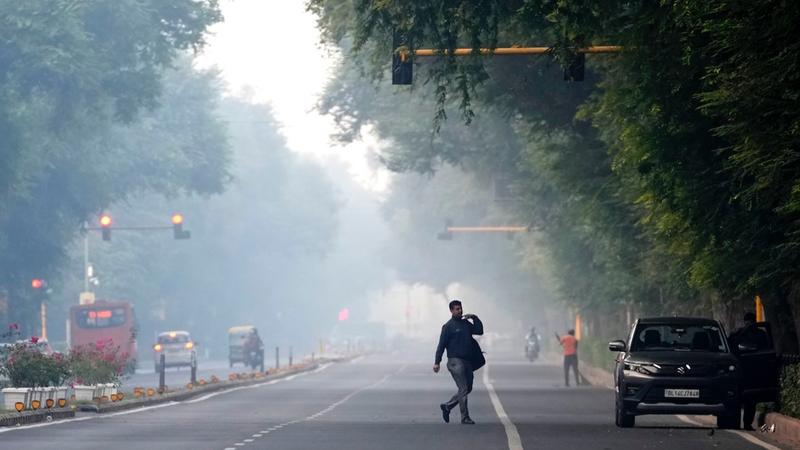Published 03:14 IST, December 6th 2024
Delhi Eases Pollution Restrictions: What's Allowed and What's Not After GRAP-3 and GRAP-4 Revoked
The CAQM revoked the stringent pollution control measures under the Graded Response Action Plan (GRAP) stages 3 and 4 in Delhi-NCR.

New Delhi: In a significant move, the Centre's air quality panel, the Commission for Air Quality Management (CAQM), on Thursday, revoked the stringent pollution control measures under the Graded Response Action Plan (GRAP) stages 3 and 4 in Delhi-NCR. With the air quality index (AQI) improving in recent days, the restrictions were eased to Stage 2 of GRAP, which is less severe but still aims to combat rising pollution levels. Meanwhile, the Directorate of Education has issued a notification, instructing the schools in Delhi to switch to physical mode from online mode.
As the government continues to monitor the air quality, the easing of restrictions is said to be a temporary relief, as the pollution level continues to fluctuate. However, experts agree that long-term solutions, such as improved vehicle emissions standards, stricter industrial regulations, and regional cooperation on agricultural stubble burning, are crucial to making air quality improvements sustainable.
With CAQM easing the GRAP restrictions in Delhi-NCR, here is a list of things allowed and not allowed in the country, as GRAP-II comes into effect.
What Is Allowed
As the restrictions moved to Stage 2, several measures were relaxed, making daily life easier for many in Delhi and the National Capital Region (NCR). The key changes include:
Coal and Firewood Usage
The ban on the use of coal and firewood in industries, commercial establishments, and eateries has been lifted. This relaxation allows businesses to return to normal operations, especially restaurants and industrial units reliant on these fuels for cooking and heating.
Traffic and Transportation
The entry of trucks carrying non-essential goods is allowed without the stringent requirement of running on CNG, LNG, or BS-VI diesel, which was enforced under GRAP-3 and GRAP-4.
Diesel-powered medium and heavy goods vehicles (BS-IV or lower) are no longer prohibited, except in cases where they are used for essential services. Furthermore, restrictions on non-essential light commercial vehicles from outside Delhi have been eased, meaning more vehicles can enter the city.
Construction and Demolition Activities
The suspension of construction and demolition activities, which was considered a key aspect of the more severe stages, has also been lifted, allowing public and private construction projects to continue.
Industrial and Commercial Operations
After the lifting of GRAP-III, and IV stage, factories and industries operating in Delhi-NCR, which had been under strict restrictions, can now function under Stage 2, provided they adhere to other environmental guidelines.
What’s Not Allowed
Despite the easing of restrictions, some curbs remain in place to continue combating pollution, ensuring the air quality does not deteriorate again:
Ban on Outdoor Burning
The ban on outdoor burning of waste and agricultural residue, which worsens air quality during the winter months, remains in effect.
Construction and Demolition Controls
While some construction projects can resume, the most hazardous activities, such as large-scale demolition, remain restricted to prevent dust and particulate pollution from spiking.
Truck Restrictions
While the restrictions on non-essential trucks have been relaxed, there remains a prohibition on trucks that do not comply with emissions standards, especially those that are older and more polluting.
Fireworks and Stubble Burning
The ban on the use of fireworks during certain times, especially around festivals, is still in place, and the authorities continue to discourage stubble burning in neighbouring states like Punjab and Haryana.
Air Quality Improved
For the second consecutive day, Delhiites experienced cleaner air with the AQI recorded at 165, which falls under the "moderate" category. The Supreme Court had earlier allowed the Commission for Air Quality Management (CAQM) to relax the curbs due to the improvement in air quality. With the AQI levels not crossing the 300 mark in the past four days, the court has emphasized that Stage-3 restrictions will only be enforced if the AQI exceeds 350, while Stage-4 curbs will come into play if it crosses 400.
The reduction in pollution levels is a welcome change for many residents of Delhi, who had faced severe smog and breathing difficulties due to the toxic air. However, environmental experts caution that the situation can quickly turn for the worse, especially with the onset of winter when air quality tends to degrade. The CAQM has made it clear that the restrictions may return if the AQI rises again, and Stage-3 or Stage-4 curbs may be enforced to protect public health.
Get Current Updates on India News, Entertainment News along with Latest News and Top Headlines from India and around the world.
Updated 03:14 IST, December 6th 2024




